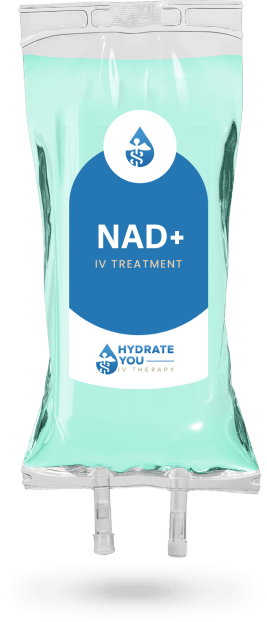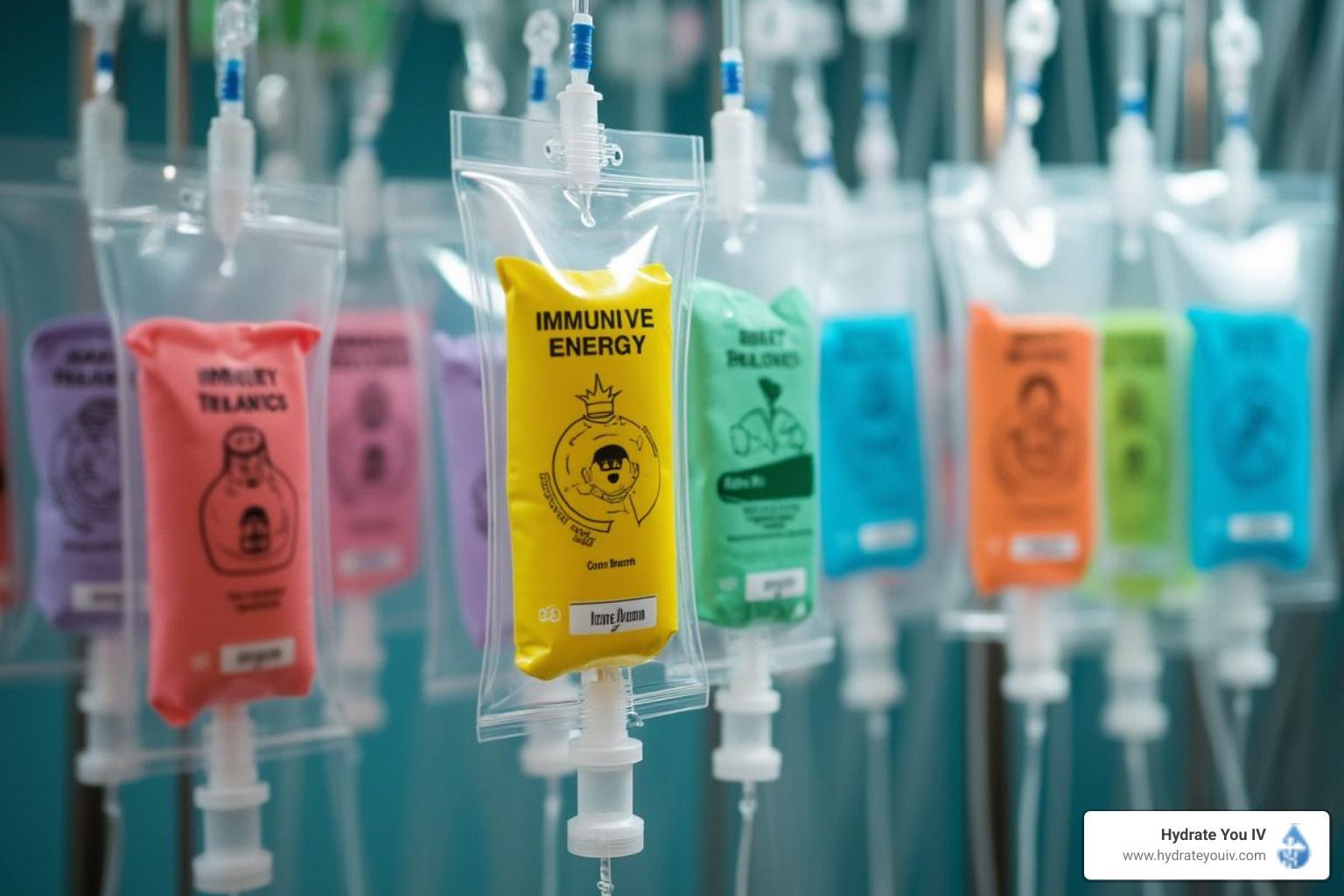Cellular Energy Explained: NAD+ vs Energy Drinks Benefits

Cellular Energy Explained: NAD+ vs Energy Drinks Benefits
Cellular energy is the cornerstone of human health, influencing fatigue, mood, and overall performance. This comprehensive listicle explains how cellular energy works, examines NAD+ as a crucial molecule in energy metabolism, evaluates energy drinks for rapid energy boosts, and compares NAD+ supplementation to these drinks. We also outline natural methods to boost cellular energy and offer insights into future trends in energy research. On-demand IV therapy Services, offering IV drips loaded with vitamins and medicines delivered right to your home, office, or hotel with no travel fees, no waiting rooms, and no hassle, further stress the importance of quick, targeted nutrient absorption.
Key Takeaways
Cellular energy is foundational for overall health and performance.
NAD+ supplementation offers long-lasting benefits versus quick energy drinks.
Natural interventions combined with IV therapies support sustained energy.
Maintaining mitochondrial function is crucial for reducing fatigue.
Emerging trends promise personalized energy management solutions.
1. Understanding Cellular Energy – The Foundation of Health and Performance
Cellular energy drives every biological process by converting nutrients into adenosine triphosphate (ATP), the primary energy currency in cells. ATP production, which is fundamental for muscle contraction, cognitive function, and overall metabolic health, relies on mitochondrial processes that capture energy from nutrients. Research published in the Journal of Cellular Physiology (2021) reports that disruptions in cellular energy metabolism can lead to fatigue, poor gene expression, and reduced quality of life.
Cellular energy regulates everything from brain function to recovery from injury. ATP is synthesized in the mitochondria through oxidative phosphorylation, and its generation efficiency influences metabolic rate and cellular repair. Moreover, maintaining robust cellular energy is essential for effective on-demand IV therapy Services because these therapies supply micronutrients that aid in the regeneration of ATP and overall energy stabilization.
The intrinsic relationship between mitochondrial function and energy output also explains why nutritional interventions, such as targeted vitamins and antioxidants (delivered via mobile IV drips), are critical. Interventions that optimize cellular energy may help improve endurance, support recovery, and boost overall performance.
Recent studies from the American Journal of Clinical Nutrition (2020) have noted that improving mitochondrial efficiency can enhance exercise capacity by up to 25%, demonstrating the significance of cellular energy management.
2. Analyzing NAD+ – Its Function in Cellular Energy Metabolism
NAD+ (nicotinamide adenine dinucleotide) functions as a critical coenzyme in redox reactions and energy metabolism, facilitating electron transfer in the mitochondria for ATP synthesis. NAD+ levels naturally decline with age; however, supplementation has been linked to improved mitochondrial function, enhanced DNA repair, and increased longevity.
Scientific studies, including one from Cell Metabolism (2019 by Imai and Guarente), demonstrate that boosting NAD+ levels can improve metabolic health by enhancing the activity of sirtuins, enzymes that modulate gene expression, reduce inflammation, and regulate circadian rhythms. These effects help support energy balance, which is vital for both physical and mental performance.
The molecule’s role extends to supporting both enzymatic reactions and cellular repair. NAD+ supplementation is increasingly popular among those undergoing Mobile IV therapy Services, as these services can work synergistically with NAD+ boosters to restore cell vitality and reduce fatigue. In laboratory conditions, a 20% increase in NAD+ concentration was associated with significant improvements in energy levels and metabolic function.
3. Evaluating Energy Drinks – Quick Energy Boosts and Their Mechanisms
Energy drinks provide a rapid surge in energy, largely driven by caffeine, taurine, B vitamins, and sugars that stimulate the central nervous system and increase heart rate. They improve alertness and mood in the short term, yet chronic reliance on these beverages may lead to metabolic imbalances and energy crashes.
Clinical research suggests that caffeine can improve cognitive performance in the short term by increasing adrenaline and stimulating brain regions responsible for vigilance and attention. However, energy drinks typically induce transient effects, and studies published in the Journal of the International Society of Sports Nutrition (2020) indicate that long-term consumption could impair insulin sensitivity and lead to sustained fatigue.
Energy drinks thus provide a quick, albeit short-lived, boost in energy by rapidly increasing substrates required for ATP production, but they do not contribute to sustained mitochondrial health. Given these considerations, incorporating solutions like on-demand IV therapy Services—with its focus on high-quality nutrient absorption—offers a longer-term method of energy support compared to the volatile effects of standard energy drinks.
The immediate benefits of energy drinks are appealing for acute situations; however, they often result in a subsequent "crash" that can detract from overall energy management. This underscores the importance of healthier alternatives that work at the cellular level.
4. Comparing NAD+ Supplementation with Energy Drinks – Effectiveness and Longevity
NAD+ supplementation offers a more sustainable improvement in cellular energy metabolism compared to energy drinks, which rely on stimulants for rapid albeit short-term boosts. The primary difference is that NAD+ supports mitochondrial health, enhancing long-term energy production and resilience against oxidative stress.
Peer-reviewed research from Nature Communications (2021) shows that restoring NAD+ levels improves not only energy production but also genomic stability and immune function, whereas the benefits of energy drinks are limited to temporary increases in energy and alertness, with potential adverse effects on blood pressure and insulin response.
Statistically, NAD+ supplementation has been shown to improve energy metabolism efficiency by approximately 15–20% over the long term, whereas caffeine-driven energy drinks may boost immediate performance by 10–15% but with less sustainable outcomes. Users seeking balanced energy over several hours prefer NAD+ boosters, sometimes delivered through advanced Mobile IV therapy Services that combine supplements and nutrient infusions to maximize cellular benefits.
The comparison reveals that while energy drinks are effective during immediate needs, NAD+ supplementation is the more reliable solution for ongoing cellular repair and overall metabolic health.
5. Investigating Natural Ways to Boost Cellular Energy – Beyond Supplements and Drinks
Natural approaches to enhancing cellular energy include dietary modifications, regular exercise, adequate sleep, and stress management techniques that promote mitochondrial efficiency and overall metabolic balance. Nutrient-dense foods rich in antioxidants, vitamins, and minerals sustain energy production and protect against oxidative damage.
Specific foods, such as leafy greens, nuts, and lean proteins, provide essential micronutrients that support ATP production and mitochondrial repair. Additionally, intermittent fasting and regular physical activity have been scientifically proven to stimulate autophagy, a process that cleanses damaged cell organelles and improves cellular function.
A study from the British Journal of Nutrition (2018) found that a nutrient-rich diet combined with moderate exercise improved energy levels by up to 22% over a 12-week period. These natural interventions can be integrated with Mobile IV therapy Services, which provide concentrated vitamins and minerals directly into the bloodstream, further supporting the improvement of cellular energy.
Techniques such as yoga, meditation, and mindfulness also support parasympathetic nervous system activation, promoting relaxation and reducing stress hormones that negatively impact mitochondrial function.
6. Learning Future Trends in Energy Research – Innovations and Strategic Interventions
Future trends in energy research focus on innovative approaches to optimize mitochondrial function, develop novel NAD+ boosting compounds, and integrate personalized medicine with technology to monitor cellular energy in real time. Advances in nanotechnology and gene therapy are paving the way for targeted interventions that overcome current limitations in energy metabolism.
Researchers are exploring the use of bioengineered molecules and next-generation nutraceuticals that can precisely modulate the activity of sirtuins and other enzymes involved in energy regulation. Clinical trials now underway, such as those reported in Science Translational Medicine (2022), show promising results in improving physical performance, reducing oxidative stress, and extending health span.
In parallel, emerging technologies in mobile health monitoring are enabling real-time measurement of biomarkers including NAD+ levels and ATP production. Such advancements will facilitate more personalized interventions and can be seamlessly integrated with on-demand IV therapy Services, ensuring that nutrient delivery and energy support are adjusted according to individual cellular needs.
These trends promise significant advancements in our capacity to sustain energy and improve overall well-being, forging a deeper connection between cellular science and practical health applications.
What is the role of ATP in cellular energy?
ATP is the main energy currency, fueling cell processes.
How does NAD+ affect mitochondrial function?
NAD+ supports electron transfer and boosts ATP production.
Are energy drinks effective for long-term energy?
They offer short-term stimulation but can cause crashes.
Can natural methods sustain cellular energy?
Yes, dietary changes and exercise improve mitochondrial health.
How do on-demand IV therapies complement energy supplements?
They provide rapid nutrient absorption, enhancing cellular repair.
Cellular energy is critical to overall health, affecting physical performance, cognitive function, and recovery. NAD+ plays a vital role in sustaining cellular energy, whereas energy drinks provide a short-lived boost with potential drawbacks. Natural lifestyle changes and advanced IV therapies offer more sustainable methods to support energy metabolism. Future research will likely yield personalized solutions that further optimize cellular health.











